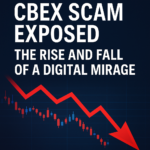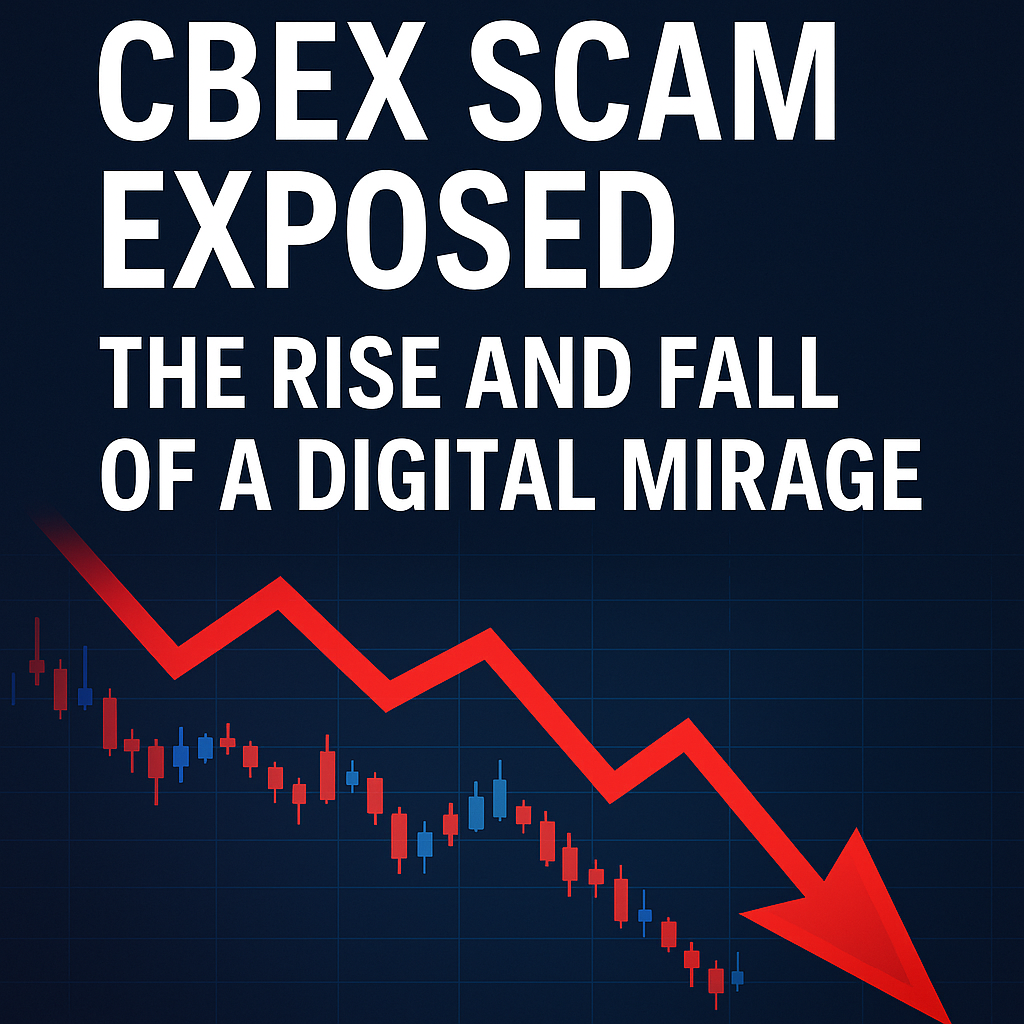In a digital world hungry for fast wealth, CBEX emerged as a shining promise, drawing in thousands with the lure of astronomical profits, AI-driven trading, and international credibility. But behind the glossy surface was a ticking time bomb—one that would explode, taking with it billions in investor funds, especially across Nigeria and Africa. The CBEX Ponzi scheme is now etched into the financial history books as one of the most elaborate digital scams of recent years. This post takes a deep dive into the making, rise, unraveling, and consequences of the CBEX debacle.
The Glittering Mirage
CBEX, which falsely claimed to stand for China Beijing Equity Exchange, positioned itself as a revolutionary financial platform. Its sleek website, high-tech jargon, and promises of a 100% return on investment within 30 days made it seem too good to be true—and it was. With claims of using advanced AI trading bots, foreign exchange algorithms, and partnerships with global financial giants, CBEX lured in people across Africa, Asia, and the Middle East.
It operated like many pyramid schemes before it—early investors were paid using the money from new recruits. In the beginning, these returns helped spread the gospel of CBEX. Social media influencers, so-called “digital entrepreneurs,” and everyday people sang praises, shared referral links, and brought in thousands more.
The Rise: How CBEX Gained Trust
CBEX’s success hinged on its clever blend of fake legitimacy and crowd psychology. Here’s how it built momentum:
- Social Media Mastery: Telegram groups, WhatsApp forums, Instagram pages—all flooded with testimonies of CBEX “success stories.” These influencers weren’t just marketing; they were living proofs (or so it seemed) of the system’s reliability.
- Referral Incentives: Like most Ponzi schemes, CBEX thrived on a multi-level marketing structure. Every person you brought in netted you a cut of their investment, turning ordinary people into aggressive promoters.
- AI and Tech Jargon: The promise of AI-powered trading strategies gave it a futuristic sheen. Most investors didn’t understand the tech but were dazzled by it.
- Targeting Vulnerability: CBEX zeroed in on low-income and middle-class individuals desperate for financial relief. From students to traders to housewives, the dream of fast, big money was too hard to resist.
- Imitation of Authority: The platform copied branding elements from real Chinese institutions, giving it an air of government endorsement. It even used forged documents and fake licenses to appear regulated.
The Nigerian Boom
Nigeria became CBEX’s ground zero for growth. The country’s high digital penetration, rising youth unemployment, and existing financial desperation created the perfect breeding ground for a scam of this magnitude. At its peak, CBEX was believed to have millions of registered users in Nigeria alone.
Some users invested life savings, others borrowed, while a few sold property just to “double” their money. In cities like Lagos, Port Harcourt, Ibadan, and Abuja, CBEX seminars were held weekly, drawing massive crowds.
“CBEX has changed my life,” one young man testified in a now-deleted YouTube video. “I bought a car last week. Next month, I’m opening my dream business.”
Stories like these went viral. People feared missing out, and the spiral continued.
Cracks Begin to Show
By late 2024, signs began emerging that not everything was right with CBEX.
Withdrawal Delays: Investors began experiencing delays in accessing their funds. CBEX explained these away as “system upgrades” or “wallet synchronization.”
Changing Terms: The platform started tweaking its rules—raising the minimum withdrawal threshold, reducing bonuses, and even limiting certain users.
Regulatory Red Flags: In November 2024, the Hong Kong Securities and Futures Commission (SFC) issued a warning that CBEX was operating without a license. It categorically stated CBEX had no links to the official China Beijing Equity Exchange.
Still, many ignored the warnings. The promise of returns was louder than caution.
The Collapse
The house of cards came crashing down in early April 2025. Without warning, CBEX locked thousands of users out of their accounts. Withdrawals stopped. Login credentials failed. Customer service channels disappeared overnight.
In Nigeria, chaos broke out.
Angry investors stormed CBEX office fronts in cities like Ibadan and Lagos.
Telegram and WhatsApp groups that once buzzed with excitement were now flooded with panic and despair.
Some victims attempted self-harm. Others filed police reports. Many simply wept.
It was then revealed that CBEX had defrauded investors of an estimated ₦1.3 trillion (approximately $800 million USD), though some analysts suggest the real figure was closer to $12 million. The discrepancy comes from inflated figures shared in online forums versus confirmed forensic financial tracking.
The Kenyan Link
While Nigeria bore the brunt of the scam, Kenya was not spared. A growing number of Kenyan investors had also bought into CBEX through Telegram promotions. Some sold livestock, pulled together chamas (community savings), and joined in hopes of multiplying their earnings. As with others, their dreams turned to dust.
Kenyan authorities have since begun issuing warnings about such foreign platforms and tightening rules around unregulated digital investments.
Psychological Toll
The emotional damage left in CBEX’s wake cannot be overstated:
Trust Broken: Many victims were recruited by friends or family. Now, those relationships are strained or broken.
Mental Health Struggles: Therapists in Nigeria and Kenya reported a spike in anxiety, depression, and even suicide ideation linked to CBEX losses.
Shame and Silence: Victims hesitate to speak out publicly for fear of embarrassment. The shame of being “fooled” keeps many silent.
Legal and Political Repercussions
Several lawsuits have been filed across Nigeria. Some lawmakers are now calling for tighter crypto regulations and mandatory registration of digital investment platforms. However, the digital and borderless nature of CBEX complicates legal recourse.
Interpol has reportedly launched an investigation into the masterminds of the scheme, some of whom are believed to be operating from Dubai, Singapore, and Malaysia. Arrests have yet to be made public, and many victims fear justice may never be served.
In the meantime, watchdogs like Nigeria’s SEC and EFCC have launched fresh crackdowns on similar platforms.
The Anatomy of a Ponzi Scheme
CBEX followed the classic Ponzi playbook:
- Promise Unrealistic Returns: Anything above 10–20% monthly should be a red flag.
- Exploit Social Proof: Using testimonials and success stories to lure others.
- Create Urgency and Exclusivity: “Only 100 more slots!” or “Join before the system closes.”
- Make It Complex: Throw in terms like AI, arbitrage, staking, blockchain, and DeFi to confuse and impress.
- Collapse When New Money Stops: The system inevitably fails when no new investments come in.
Lessons Learned
From the ashes of CBEX come hard but necessary lessons:
Due Diligence is a Must: Before investing, verify licenses, check regulatory warnings, and study the company’s history.
If It Sounds Too Good…: It probably is. Financial growth is usually steady, not exponential.
Avoid Herd Mentality: Just because “everyone” is doing it doesn’t mean it’s legit.
Regulatory Education: Governments need to do more to educate citizens on digital scams and risky investments.
Report Early: Early warning signs should be reported to authorities and shared widely.
Hope After the Scam
Though CBEX left thousands devastated, it also spurred new conversations:
Financial literacy programs are being introduced in communities.
Survivors are forming support groups and sharing their stories to prevent others from falling victim.
Governments are slowly waking up to the dark side of fintech and digital investing.
As one victim in Ibadan put it, “We were chasing shortcuts. But now we’re learning the long road might be safer.”
Final Thoughts
CBEX Scam Exposed: The Rise and Fall of a Digital Mirage is more than just the tale of a scam—it’s a wake-up call. In a time when people are desperate for hope and income, the internet is full of traps disguised as opportunities. CBEX might have vanished, but the template it followed is still out there.
Let this story be a beacon—not of fear, but of awareness. Whether you’re a beginner or seasoned investor, always question, verify, and most importantly—never let greed cloud your judgment.





